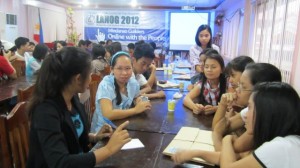
BUDDING SCRIBES. Campus journalists in Mindanao participate in the two-day conference on campus press freedom and other democratic rights, training on different levels of journalism skills and education on socio-political issues. (contributed photo)
By Marilou Aguirre-Tuburan
Davao Today
KIDAPAWAN CITY, North Cotabato, Philippines — Are campus journalists still relevant in these era of social media?
While carving their niche, editors from various colleges and universities in Mindanao aver the difficulties in popularizing their school newspapers and journals, during a Mindanao campus press conference held here recently. The 81-year old College Editors Guild of the Philippines (CEGP) hosted the two-day event which was attended by 79 participants from 19 publications.
“It’s very different today. Students tend to focus on online games and social networking sites. Writing and patronizing the school publication is boring for many of them,” laments John Rey Aleria, editor in chief of the University of the Immaculate Concepcion’s paper Collegiate Immaculate in Davao City.
Some of the school papers maintain online websites like the Atenews, the Ateneo de Davao University’s college publication. The Collegiate Headlight of the University of Southeastern Philippines (USEP) in Davao City and The Crusader of Xavier University in Cagayan de Oro City also maintain their websites.
The writers maintain that they do need to exist, that they need to publish school papers, in a legacy that goes back to the Spanish times, when Filipino illustrados and prime movers of the First Propaganda Movement — Jose Rizal, Marcelo H. del Pilar, Antonio Luna, Graciano Lopez Jaena and Mariano Ponce — published La Solidaridad, an anti-Spanish newspaper.
“Student publication does not only expose issues within the campus. It opens the minds of the students on bigger social issues,” says 19-year old Kristine Unabia, features editor of The Sword, a student publication of the Colegio de Kidapawan in this city.
For Hazel Marasigan, features writer of The Penwood, of the St. Peter’s college in Iligan City, “through their publication, students can air their sentiments towards the administration — what they really feel, if they agree with the school policies or not.” Sarah Gail Galvan, associate editor of The Beacon of the Ateneo de Zamboanga agrees with her.
Galvan said students sought the help of their publication to complain against the school’s zero-based grading system applicable for first year students. Securing passing grades have become rigid, a situation that has left many poor scholars aghast in sustaining their free education.
“The relevance of the campus press lies on the continued existence of the injustices experienced by the students inside and outside the school. Student issues like the yearly increases in the tuition and the miscellaneous fees or the repressive policies inside the campus reflect the bigger problems of the society. If the society is not liberated from these problems, campus journalists remain relevant and would continue the crusade against these injustices,” said CEGP vice president for Mindanao, Paul Randy Gumanao.
Violation of campus freedom remains high on top of the list of issues pointed out by the CEGP. Publications are targeted for censorship, where advisers or moderators meddle with the decisions of the editorial board. School administrations either withhold or fail to collect publication fees, rendering student publications unable to finance their operations.
Campus journalists were also subjected to harassment by the administration by threatening them to be expelled from school or to be charged with cases when and if they write critical articles that have bearing against the school.
There are also recorded cases of surveillance by the military against campus journalists especially in state colleges and universities. The military, according to CEGP, threatened student journalists to stop participating in CEGP or their publication’s activities because these only teach them to be “enemies of the state.”
An editor of USEP’s The Collegiate Headlight reported he was once followed by a military personnel to his home and was told not to participate in CEGP-led activities. Last February 26, CEGP National Deputy Secretary Pauline Gidget Estella, together with local formation officers and campus journalists in Samar Island, reported they were put under military surveillance while holding their Samar-wide convention. At the same date in Laguna, Ma. Luisa Purugganan, associate editor of The Warden of the Pamantasan ng Lungsod ng Muntinlupa, was also put under surveillance.
There are also schools that don’t have student publications or were closed. CEGP has been pushing for the re-opening of these publications and for those who have none to open their own. The official student publication of Cor Jesu College in Digos, Davao del Sur — The Cordial — was shut down in 2009 due to a rift between the school administration and campus journalists.
The CEGP has also been pushing for the campus press freedom bill which provides for stronger protection of students’ democratic rights, particularly the right to freedom of the press. The bill also provides a penalty clause, a thing that is lacking in the current Campus Journalism Act of 1991 or Republic Act 7079, to prosecute the violators of campus press freedom.
CEGP’s Gumanao challenges campus publication and journalists to “be brave and daring in advancing the students’ rights and welfare and in defending campus press freedom, as well as the issues that confront society as a whole.” (Marilou Aguirre-Tuburan/davaotoday.com)
campus journalist, campus writers, college editors guild of the philippines, lanog, mindanao convention of student writers, student publications, World









